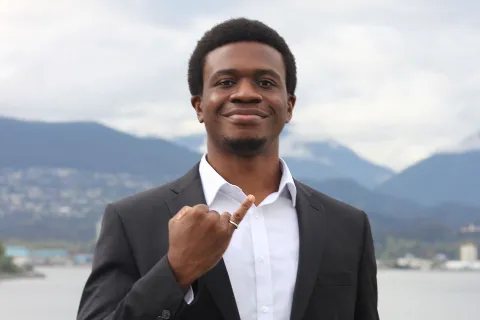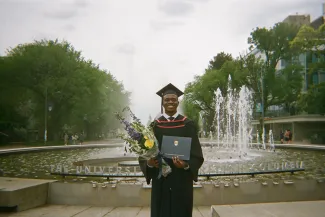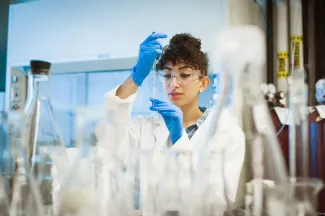"With the right mindset, we can defy our limitations and expand our horizons."

Kenechukwu Ene
- Degree:
- Bachelor of Applied Science
- Grad year: 2022
- Program:
- Campus: Vancouver
My parents often remind me of how I frequently caused a scene outside my brother’s kindergarten, during drop off and pick up times. I was too young to attend kindergarten and seemed oddly persistent about getting a head start on my ABCs and 123s. I simply wanted to know what my brother was getting up to, and to be honest, just wanted to continue hanging out just like we did at home. A persistent curiosity and longing for community made me excited about university and led me to UBC, specifically.
Over the past five years, I have asked many questions – about the world and about myself – and at UBC, I have always been able to find a community where I could at least brainstorm possible answers. Through my involvement in the Faculty of Engineering, Rezlife, and student clubs, I learned about the experiences of other students and explored how engineering systems influenced our realities during my co-op and research placements. The culmination of these experiences transformed me into a conscientious person that hopes to use technology to impact communities positively.
Why did you choose to go into your field of study at UBC?
I grew up in Nigeria and volunteered for a women's charity that addressed gender inequality by sponsoring the education of young girls. However, issues like food and health insecurity made schooling difficult and relegated families to nonideal living conditions. I became curious about how such issues could be addressed and my questions led me to Engineering.
In my first year at UBC, I took the APSC 101 course. During a group project, I helped devise a theoretical system for providing remote communities with clean water. The project aligned with my interests and I thoroughly enjoyed the technical aspects. I learned that water treatment was a strong component of the Chemical and Biological Engineering (CHBE) program and that CHBE focused on creating and scaling similar technologies so that everyday people could access their benefits. It seemed like a program I would enjoy.
I just graduated from CHBE and sincerely believe I made the right decision.

What has made your time at UBC memorable?
I am thankful for the supportive community I found at UBC and the opportunities I got to better myself.
I remember joining the UBC novice rowing program in my first year and quitting mid-season. It felt too rigorous and nearly impossible to combine with my studies. From speaking with my mentors and peers, I realized how my perspective contributed to the outcome. I needed to adopt the right mindset if I hoped to be successful.
I joined the novice program again in my third year and this time, I completed the season and even made the Dean's list. The following year, I was tasked with leading a project to develop affordable ventilators for COVID-19 relief. Again, I could either feel overwhelmed and quit or believe in my abilities. I chose the latter and the unexpected happened. A venture capitalist expressed a desire to invest in the project!
What advice would you give a student entering your degree program?
I think of education differently now. In my experience, I found that academic success involves more than just studying. In my experience, university seems to be about leveraging the resources available to you – books, yes, but also advisors, relevant clubs, professors and most importantly, your peers. My suggestion is to consider planning out your degree with your advisors so you may find time to join an engineering design team, bond with your professors and peers, and subsequently gain greater insights into your studies.
It may feel counterintuitive, but I would also recommend becoming comfortable with failure. I believe there is much to learn by exploring our curiosities. Sadly, this may likely lead to failure. Our reaction to failure is however often more important than failure itself. Try not to let disappointments dampen your spirit. Instead, study the many lessons that come from them and let them fuel your desire for success.
My last piece of advice is to learn to shape your mindset. We are only as capable as we say we are. Situations are only as bearable as we say they are.
What are your future plans to make a difference in our world?
I hope to one day develop a process or product that has a large-scale impact on the lives of everyday people.
During my degree, I learned to develop chemical and biological processes and products that are used in our daily lives. I particularly enjoyed my Process Control course which discussed how to scale up and manage processes. I completed an undergraduate thesis, as a result, and explored applications of artificial intelligence in industrial control systems. While I believe I have learned the essentials, I appreciate that the reality of process/product development and management can differ from the theory.
I now look forward to joining IBM as a Consultant. There, I hope to learn how to design and implement technical projects for developing processes and products that are people-focused, have large-scale impacts, require continuous innovation and leverage cutting edge technologies such as hybrid cloud and artificial intelligence.




